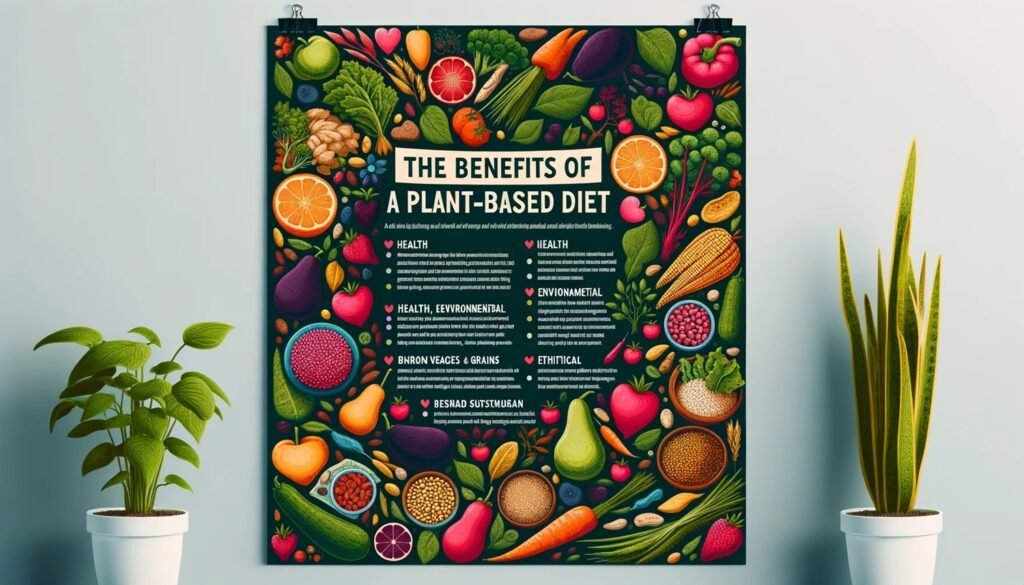
The movement towards a plant-based diet has gained significant momentum in recent years, driven by a growing awareness of health, environmental, and ethical considerations. This diet emphasizes foods primarily from plants. This includes not only fruits and vegetables, but also nuts, seeds, oils, whole grains, legumes, and beans. It doesn’t necessarily mean that you are vegetarian or vegan and never eat meat or dairy. Rather, you are proportionately choosing more of your foods from plant sources. Here, we delve into the myriad benefits of adopting a plant-based diet and how it can transform your health and the planet.
Contents
Health Benefits
1. Rich in Nutrients
Switching to a plant-based diet means increasing the consumption of vitamins, minerals, and antioxidants. Foods like fruits, vegetables, nuts, seeds, and whole grains are loaded with beneficial nutrients that can help lower blood pressure, improve heart health, and reduce the risk of chronic diseases.
2. Weight Management
Plant-based diets are effective for weight loss and management because they are rich in fiber, which helps keep you fuller longer. Moreover, plant-based foods typically have fewer calories than animal products, aiding in weight management.
3. Lower Risk of Chronic Diseases
Research has consistently shown that a plant-based diet can reduce the risk of developing heart disease, diabetes, and certain types of cancer. This diet helps maintain a healthy heart by reducing arterial plaque and enhancing blood flow.
4. Improved Digestion and Gut Health
The high fiber content in a plant-based diet not only helps regulate bowel movements but also promotes a healthy gut microbiome, crucial for good digestion and overall health.
Environmental Benefits
1. Reduces Environmental Impact
Adopting a plant-based diet is one of the most effective actions an individual can take to lower their carbon footprint, reduce water usage, and decrease pollution. It significantly reduces the demand for resources required to raise livestock, such as land, water, and food.
2. Promotes Biodiversity
Livestock farming is a major cause of deforestation and habitat destruction. Switching to a diet that requires less land can help preserve natural habitats and promote biodiversity.
Ethical Considerations
1. Animal Welfare
Reducing the consumption of animal products can lead to higher welfare standards by decreasing the demand for intensive animal farming practices, which often involve significant animal suffering.
2. Fairer Global Food Distribution
A plant-based diet can contribute to fairer global food distribution. Growing crops to feed humans rather than livestock is a more efficient and sustainable way of using resources.
Conclusion
Embracing a plant-based diet can significantly impact your health, the environment, and animal welfare. By making informed choices about the food we eat, we can contribute to a healthier and more sustainable world.
FAQs about a Plant-Based Diet
Q: Do I need to completely eliminate meat from my diet to enjoy the benefits of a plant-based diet?
A: No, you don’t need to completely eliminate meat. The idea is to increase the proportion of plant-based foods in your diet.
Q: Will I get enough protein on a plant-based diet?
A: Yes, a well-planned plant-based diet can provide all the necessary protein through grains, legumes, nuts, and seeds.
Q: Can a plant-based diet provide enough iron?
A: Plant-based diets can provide iron through dark leafy greens, legumes, and fortified foods. Consuming vitamin C-rich foods can help enhance iron absorption.
Q: Is a plant-based diet expensive?
A: It can be budget-friendly. While some specialty items can be expensive, basic plant-based ingredients like beans, rice, and seasonal vegetables tend to be very affordable.
Q: How can I start transitioning to a plant-based diet?
A: Begin by incorporating more fruits, vegetables, and whole grains into your meals. Gradually replace meat and dairy with plant-based alternatives.